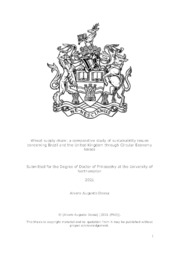Wheat supply chain: a comparative study of sustainability issues concerning Brazil and the United Kingdom through Circular Economy lenses.
Wheat supply chain: a comparative study of sustainability issues concerning Brazil and the United Kingdom through Circular Economy lenses.
Author(s): DOSSA, A. A.
Summary: Wheat is one of the most important staple crops globally. It covers more planted area than any other grain and is the most traded major cereal. Therefore, by improving the sustainability of wheat food supply chains, all sustainability aspects are enhanced. One of the most prominent schools of thought regarding sustainability is the Circular Economy (CE). Despite previous works addressing the adoption of CE practices in supply chains ? no previous research addressed how transactions between actors in those supply chains influence the adoption of CE practices. The goals of the CE are to overcome the predominant take-make-dispose model of the contemporary economy favouring a restorative and regenerative system. This thesis differed from past research by analysing a long food supply chain, that is, a supply chain with several links from farmers to market. Furthermore, it focuses on the role that transactions between organisations in the supply chain have in the adoption and diffusion influencers of CE practices. To accomplish this, Transaction Cost Economics (TCE) was used as the supporting theoretical body to the discussions of the transactions between the organisations in the supply chain. The unit of analysis were wheat food supply chains in Brazil and the UK. This research is classified as a qualitative and comparative case study. The investigation identified that all of the CE practices found in the literature with application in the agri-food context were present in the supply chains. Additionally, the material flow was mapped and included potential wastes and by-products flowing in circular loops. There are more similarities than differences in CE practices happening in both countries. The wheat food supply chain transactions have, as a general rule, low asset specificity, mid to high level of uncertainty, long-term contracts, and have varying levels of formalisation. Transaction dimensions have multiple roles within CE diffusion influencers. The research showed that uncertainty in transactions increases barriers to the adoption of a CE practice, especially concerning market issues. Asset specificity has a double directional role, both strengthening and being strengthened by the drivers, particularly consumer demands. Finally, long-term (repeated), formal or informal transactions facilitate the diffusion of CE practices in the supply chain. These roles are fluid and dependent on negotiations that are affected by the power asymmetry between the actors in the buyer-supplier dyads.
Publication year: 2021
Types of publication: Theses
Unit: Embrapa Wheat
Observation
Some of Embrapa's publications are published as ePub files. To read them, use or download one of the following free software options to your computer or mobile device. Android: Google Play Books; IOS: iBooks; Windows and Linux: Calibre.
Access other publications
Access the Agricultural Research Database (BDPA) to consult Embrapa's full library collection and records.
Visit Embrapa Bookstore to purchase books and other publications sold by Embrapa.

